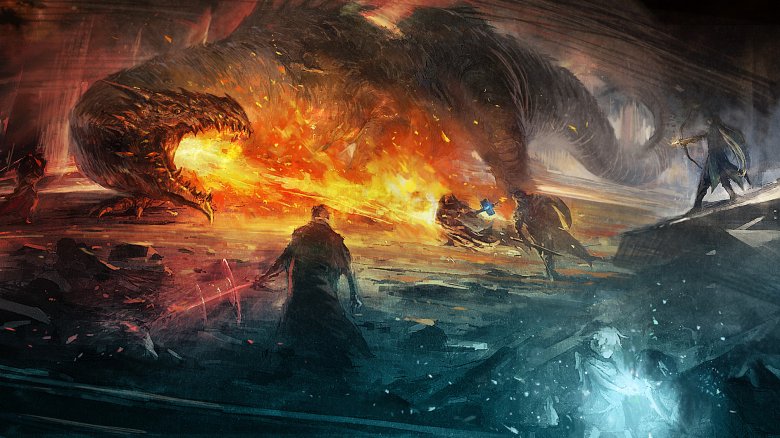Shady Video Game Kickstarters That Ran Away With Your Money
Valve's Steam platform first showed the world how the internet could transform the gaming marketplace: by allowing buyers to legally purchase games for download. This led to a revolution in who could make games, since anybody could publish to the Steam platform on their own. But even as digital downloads became more common, that new model never solved the problem of funding a game in the first place. Without the money to make the game, many talented individuals and teams would never be able to bring their visions to life.
Crowdfunding changed all that. With the ability to skip traditional investors and go straight to the people, small teams could drum up the necessary funding to get their game ideas into the hands of players. Kickstarter remains the most popular crowdfunding platforms, particularly for video game developers. Some fantastic games which never would have seen the light of day otherwise have emerged from this process.
But not every Kickstarter project has been a success. Sometimes, the final result simply wasn't very good. And in the worst-case scenario, a project can be funded... and then disappear. Thousands of dollars can vanish into thin air, leaving backers angry, frustrated, and feeling robbed. Here are some shady video game Kickstarters that ran away with your money.
Mansion Lord never paid back the mortgage
Mansion Lord sounds like a perfect marriage of different gaming genres: it's a murder mystery, an RPG, and a business sim all rolled into one, with a beautiful retro art style. It even involves elements of procedurally-generated world-building. It's available on a variety of different platforms, and it even got Valve's seal of approval through their Steam Greenlight service. It only has one problem: it doesn't exist.
The developer behind the project is Golgom Games. Who are Golgom Games, you might ask? It's a good question that doesn't appear to have a good answer. All we know is that the final update for the project was just a request for even more money via PayPal. After that post in August of 2014, there has been complete radio silence. The project raised nearly $31,000 on Kickstarter, and probably raised even more via PayPal. So far as anyone knows, that money is simply gone.
Given the complete lack of updates, and the fact that even the developer's website has gone down, Mansion Lord looks like it was a scam from the start. Somebody cut a slick trailer together, posted it to Kickstarter, let the dollars flow in, and then rode off into the sunset. With your money.
Project Phoenix never rose
Project Phoenix was a massive success on Kickstarter, raising over $1 million. Why so much interest in the game? Because its team was composed of industry veterans who'd worked on blockbuster titles ranging from Diablo III to Halo 4. But Project Phoenix was intended as a Japanese RPG with strategy elements, and it was no coincidence that most of the team had deep experience in the legendary Final Fantasy series. Most notably, Final Fantasy composer Nobuo Uematsu was also attached to Phoenix.
Yet despite the fantastic fundraising and raw talent, years crept by...and Project Phoenix was still vaporware. Eventually, news of a different sort emerged: game director Hiroaki Yura would release, but it wasn't the one people had funded. Instead, it was an entirely different project called Tiny Metal. Backers rightly wondered if their money, meant for the former game, had instead gone into the latter. And then came the accusation from within: Tiny Metal's own PR manager, Tariq Lacy, accused Yura of running a scam. The crowd's money was indeed going to the wrong title.
Yura has since defended himself, claiming that Tiny Metal had to be produced first for business reasons, and that Project Phoenix' money hasn't been touched. He has also claimed that Phoenix will still be coming, just a few years late. But without any signs of progress five years after the game was funded, skepticism is running high.
LA Game Space never found a place
The LA Game Space was a bit of a different idea: instead of producing an actual game, it would produce a physical co-working office space where small teams who couldn't afford formal offices could come together and get their work done. In other words, the guys behind LA Game Space would produce the location that would, in turn, produce games. Not a bad idea! If, you know, they'd actually done it.
The Kickstarter campaign succeeded, bringing in over $300,000. Shortly afterwards, the team started hosting events as a sort of taster for what the Game Space itself would be able to do later: become a forum for speakers and panelists to talk about game production. And then... they stopped. No new events have been scheduled since 2016, and the team has not updated backers on their progress since 2014.
Office space in Los Angeles is expensive, and even $300,000 will only get you so far. Still, that was real money taken from real people, and no co-working environment was ever delivered. Refunds have not been issued. At this point, it seems unlikely that any new word about the project will ever be spoken, and that money is simply gone. Who knows what games might have been created at the LA Game Space, if only it had actually happened?
Unwritten: That Which Happened... didn't
Unwritten: That Which Happened was intended to be a 4X game like Civilization, but with a narrative twist. Not only would there be a story, but the player would get to make decisions that would affect the overall game. Combined with a cave-painting art style and a director who'd worked on Dishonored, the idea was appealing enough to earn almost $80,000 during its Kickstarter campaign in 2013. Five years later, the game hasn't progressed beyond the Kickstarter page itself.
Joe Houston, the driving force behind the game, admitted in a post to backers that he had been forced to abandon the original production schedule. While he said there were a number of reasons for this, foremost among them was that his wife and daughter developed health issues that required his time and attention. And while that much is certainly understandable, the question remains: what happened to the money? To his credit, Houston did offer a refund to those who wanted one. But he also promised that if people didn't take their money back, he would complete the game.
Since then, there's been silence. It's not clear whether or not a backer can request a refund anymore, despite the complete disappearance of the project. There's no question that Houston's family situation was tragic. Nevertheless, those who invested their money have been left in the lurch.
Yogventures didn't yogvance very far
The story of Yogventures is that of a good idea, with good intentions, gone wrong. The brainchild of the Yogscast group of YouTubers, Yogventures was intended to be a fully-customizable world-building sandbox. Somewhat like Minecraft, but with higher-res assets, players would be able to construct their own environments, challenges, and rules, effectively creating their own games within the larger product. It would be unbridled imagination mixed with gorgeous art, conceived and supported by popular new media influencers. And, once the Kickstarter campaign completed, it raised over $500,000 of fan money. What could go wrong?
How about this? Yogscast handed actual development of the game over to a brand-new studio, Winterkewl Games. And as it turned out, they didn't quite know what they were doing. Winterkewl's staff apparently all had day jobs as well, so work on the game could only be done after-hours. Of course, it turned out that making a game is hard, and the team blew through all the Kickstarter money fast. Eventually, Winterkewl was forced to close its doors, and when this happened, Yogscast cancelled the project altogether.
The Yogscast offered to make it up to backers by giving them free codes to a completely different game. But that's cold comfort to those who gave their hard-earned dollars for Yogventures, specifically. While there was no real scam here, this is a classic case of an investment gone bad.
The Stomping Land ate your money
Dinosaurs are making a comeback in the popular imagination, with games like Ark: Survival Evolved and movies like Jurassic World finding enormous success. The Stomping Land intended to dive into the dinosaur fantasy even further, by providing an open world in which dinosaurs would systematically react and respond to everything that happened around them. If the player killed a dinosaur, a carnivore would seek to steal the carcass; multiple dinosaurs could be lured into a massive battle. All this would be wrapped inside standard survival game tropes like gathering resources and crafting new items. Plus, you could ride dinosaurs. The Kickstarter was funded with nearly $115,000.
At first, progress appeared to be going well. In 2014, the game arrived in early access on Steam. While in rough shape, the pre-launch version of the game pointed to exactly the game that backers had invested their money to get made. But later that same year, the game was pulled from Steam, and hasn't been seen since. The Kickstarter page hasn't received a developer update since around the same time. Backers have no idea what the status of the game is.
By this point, it appears unlikely that The Stomping Land is being worked on, or that it'll ever be released. Refunds haven't been offered. The Stomping Land is a survival game that, itself, failed to survive. But it took all the resources with it.
Xeko never did come back from the brink
Xeko was a collectible card game from the mid-2000s, themed around the ideas of biodiversity, ecosystems, and conservation. Though the original game went out of print, in 2012 creator Amy Tucker launched a Kickstarter campaign to bring it back in digital form. The core concept still held appeal, as fans of educational entertainment raised over $250,000 for the project. The Kickstarter's tagline, "Back from the brink," looked like it was coming true!
But that brink ended up being a little bigger than everybody thought. Once the Kickstarter campaign completed, everything went dark for a while. Finally, in a comment made on the Kickstarter page itself, the company behind the digital version stated that they were going bankrupt. Why? Because they couldn't proceed on production of the game while they had an outstanding lawsuit with Xeko's creator, Amy Tucker. And if you're asking what that lawsuit is about, well, keep on asking, because that's as much information as is publicly available. No other news has been heard since.
What prompted the lawsuit, or if or how it resolved, is unknown. But the fact remains that Xeko doesn't appear to be coming off the endangered species list anytime soon. It's a shame, since the card game itself has a good message and is intended to be played between kids and their parents. But good intentions sometimes result in ugly outcomes. For the backers, it appears that their donations have gone extinct.
Greed Monger became a civil war
The massively-multiplayer online (MMO) genre has been around for a while now, which means it's gone through a number of changes. Old-school fans often lament the perceived "watering down" of these games, which was why they greeted the Kickstarter campaign for Greed Monger with such enthusiasm. Promising to take players back to an older form of MMO no longer championed by major studios, it was exactly the kind of niche-appeal product that Kickstarter was born for. The campaign eventually raised over $90,000.
From there, the developers got to work. And it went poorly. Different members of the team began publicly blaming one another, claiming hostile work environments and even threatened lawsuits. One of the leads then dropped out of the project altogether. Finally, in 2016 the game was formally cancelled, putting to bed any hope that Greed Monger would ever release. Backers, meanwhile, never got their money back. Where it had gone, nobody knew. But it certainly hadn't gone into a complete, playable, old-school MMO.
But as with all good fantasy stories, there's a twist! Though the official development team appears to have taken off with, or at least spent, all the money, one of the founders of the project recently came out of nowhere to offer full refunds to anyone who requests it, paid for entirely out of his own pocket. The original donations may be gone, but at least one guy is trying to put it right.
Forsaken Fortress Strategy forsook its backers
A hybrid of the popular RPG and survival genres, Forsaken Fortress Strategy was meant to feature deep characters and challenging resource management in a post-apocalyptic world. A series of demo videos and a soundtrack sample were all posted to the Kickstarter page, giving backers a solid idea of what they were giving their money to. The campaign raised over $120,000 by the end of its run.
At first, development appeared to be proceeding well. The game released onto Steam as an early access title in 2015, and remains available as of this writing. However, judging by the reviews, Forsaken Fortress Strategy is in pretty rough shape and nowhere close to a finished product. And since 2015, no new version of the game has been released, and no word from the developers has appeared.
For all intents and purposes, the early access version appears to be the final iteration of the game. Which means that $120,000 was spent on a product that is incomplete, not fun, and nothing close to what was promised. That's, of course, assuming that all the money was spent on the development. For all we know, the developers could have just run off with most of it.
Roam didn't get very far
The developers behind Roam hacked a slick demo together, and released a video of it on their Kickstarter page. With its relatively good graphics and slick combat animations, it looked amazing for something that was apparently made in only six weeks. The description promised a much larger game that would combine the resource gathering of survival games, the loot and exploration of RPGs, and the base-building of tower defense. Plus, the maps would be randomly generated for infinite replayability. That pitch was good enough to raise $100,000.
Once the money was transferred, however, Roam's updates became few and far between. The last substantive update, in 2015, claimed that plenty of work was being done behind-the-scenes. But since then, none of that work has been publicly released.
Then things got interesting. In a backers-only post copied over to Reddit, one of the project's team members, Ryan Sharr, claimed that another member, Zach Barson, had reneged on his duties. There was a small matter of $30,000 of the Kickstarter funding involved, in which Barson had allegedly tried to cash a check without Sharr's permission. This naturally lead to lawsuits. There hasn't been any word from the developers since. And Roam is nowhere to be seen. Nor is the money, which by Sharr's own admission, has gone towards legal fees instead of game development. By this point, it's likely a bunch of gamers unwittingly funded a lawyer's vacation somewhere.
Last Life never lived at all
Last Life is a noir-style murder mystery, except the murdered character is the one investigating his own murder. Oh yeah, and it's on Mars.
Crafted in the vein of classic adventure games, its unique art style and distinctive tone captured the attention of no less than Tim Schafer, the legendary designer of adventure games like The Secret of Monkey Island. Through a new publishing arm of his studio Double Fine, Schafer threw his weight behind the project. With his blessing, the gaming community flocked to the Kickstarter campaign and raised over $100,000 for it.
Want to know the rest of the story? Well, too bad. Because that's it.
Last Life has, quite simply, disappeared. Beyond that, neither the game's creator, Sam Farmer, nor Tim Schafer are willing to talk about what happened. Was the development harder than expected? Did legal problems emerge? Was an alien invasion involved? Nobody knows; it's as though the Kickstarter never happened.
Only, the Kickstarter did happen, and the backers are out a collective $100,000. No refunds have been offered, or apologies, or even explanations. Just absolute silence.



